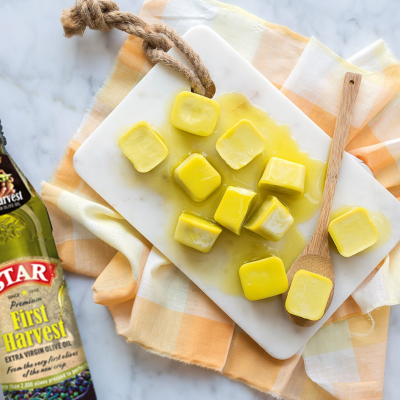
If the oil is 10 cSt at 212F then at 104F 40C it thickens up to 100 cSt and at 32F 0C to 250cSt and so on. Thats why refrigerated cooking oils can turn cloudy if the temperature usually about 40 degrees is lower than the oils freezing point.

But several factors affect exactly what temperature a given oil will freeze.
At what temperature does oil freeze. So at what temperature does oil freeze. If low temperature hydraulic fluid has not been used you could well find that the ambient temperature is below the pour point of the oil and it is solid. The pour point is when the oil simply goes solid and wont pour.
Because oil is a petroleum product it will not freeze solid in cold temperatures though it will lose its liquid qualities as temperatures fall. For example diesel oil that is cooled below 0 degrees Fahrenheit will change in color and texture becoming whitish and solid to the point that it will not flow through the engine. Can oil be frozen.
The answer is yes you can freeze vegetable oil. Freezing cooking oil of any kind is a great option for preserving the oil and extending its shelf life. Dont worry freezing your vegetable oil will not alter its usefulness or consistency.
At what temperature does oil. Olive oil unlike water that has a consistent freezing point of 32 degrees Fahrenheit will freeze but at different temperatures depending on the type of olive oil. Experimentation and experience has shown that at 10 degrees Fahrenheit more or less olive oil will freeze rock solid.
A doctor put several varieties of cooking oil in freezers and recorded their reactions at different temperatures trying to answer the question Can you freeze oil When the temperature was down at 40 degrees Fahrenheit most of the oils were still in their same. The range for petrol seems to be somewhere between -40C and -60C so its unlikely you will ever have a problem with your fuel freezing if you run your car on petrol. There are also a lot of different types of diesel fuel but the pour point might fall in a range between -6C and -18C although these values can be lowered with additives.
Most manufacturers preset refrigerator temperatures to around 37F. Chemistry texts list the freezing point of pure oleic acid at around 39F. Olive oil manufacturers dont generally list a freezing temperature because it is quite variable depending on the olive variety and ripeness of the olive at processing.
In fact a basic un-additized mineral oil can thicken so much that it will not lubricate the engine properly at all. If the oil is 10 cSt at 212F then at 104F 40C it thickens up to 100 cSt and at 32F 0C to 250cSt and so on. Because motor oil does not crystallize or solidify at any temperature it technically does not freeze though motor oils at cool or freezing temperatures 32 degrees Fahrenheit or below will begin to thicken losing the viscosity that allows the oil to flow and lubricate making them ineffective and increasing the.
The flash point of some essential oils is between 100-140F 38-60C which means that the lightest oil components may temporarily separate vaporizing in the sealed bottle. The good news is that once the bottle has cooled back down these components condense and become liquid again leaving their chemical makeup unaltered. No it does not crystalize and freeze.
But the colder it gets the thicker it gets rendering the engine virtually impossible to turn over and start. Back in the day in an air cooled VW running 2050 weight conventional oil the car would barely turn over below 25 degrees. Below about 10 degrees forget about it.
How 2 Heating Oil Freezes And Shuts Down Your Heater Normally at temperatures below 35 degrees F heating oil will start to get cloudy. This however wont affect the flow of the fuel to your heating system. The problem occurs when the temperature goes down below 20 degrees F.
Oils should be stored in a dark bottle in a cool and dark place. In general a brand new oil has about 15 to 2 years of shelf life. Once the bottle is open it should be used up within 6 months.
Air-cooled heat exchangers require that oil temperatures be at least 10 to 15 degrees Fahrenheit above the cooling air temperature. They are most effective when the operating fluid temperature is in the vicinity of 200F. Every fat or oil will turn from liquid to solid – that is freeze – at some temperature or other.
Thats why refrigerated cooking oils can turn cloudy if the temperature usually about 40 degrees is lower than the oils freezing point. But several factors affect exactly what temperature a given oil will freeze. Does mineral oil expand when frozen.
No all oils get more dense when they are cooled. Most crude oils do not actually freeze as they are incapable of developing crystalline structures. But some crude oils have a high amount of paraffin and have a pour point above 80 deg F.
That means they are solid if they drop below 80 degrees. At what temperature does vegetable oil freeze. Ensuring a hydraulic system is warm enough to use is essential for safe and efficient operations.
Hydraulic fluid freezing point is -10 F below which renders the fluid unusable. Even when temperatures are above the freezing point the viscosity of the oil. Most base oils and greases are able to withstand moderate temperature dips to 0 degrees C and many to minus 10 degrees C without much decrease in performance.
However at minus 20 degrees C and beyond some lubricants become unsuitable and begin to reach their pour point.